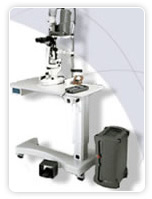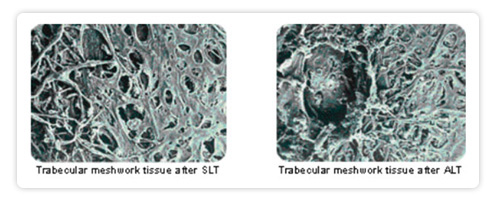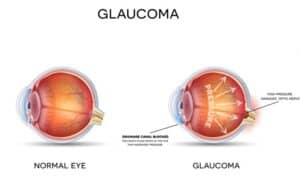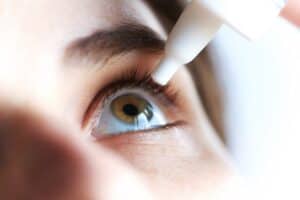Also serving patients in Fort Lauderdale
Serving Patients in Miami and Ft. Lauderdale
What is Glaucoma?
Glaucoma is a condition where the intraocular pressure is high enough to gradually damage the optic nerve, causing progressive loss of the peripheral visual field. Laser Eye Center of Miami has eye surgeons that specialize in glaucoma treatment and surgery.
Types of Glaucoma
Chronic Open Angle Glaucoma
The most common type of glaucoma is chronic open angle glaucoma in which there is a blockage to the outflow of the aqueous humor at the molecular level. It is painless progressive gradual decrease in peripheral vision. The absence of symptoms in this type of glaucoma is one of the reasons why periodic ocular examinations are so important. Besides checking the intraocular pressure, the eye doctor will perform computerized visual field testing and will objectively measure the optic nerve.

At the Laser Eye Center of Miami we have one of the few Optical Coherence Tomography (OCT) units available in South Florida. The OCT is the most accurate method in the management of glaucoma to measure the optic nerve and the nerve fiber layer.
The main goal in the treatment of open angle glaucoma is the lowering of intraocular pressure. It could be accomplished with glaucoma eye drops, with Selecta Trabeculoplasty laser, or conventional surgery. At the Laser Eye Center of Miami we have Selective Laser Trabeculoplasty where a mild laser is used to improve the outflow of aqueous minimizing the use of conventional drops.
Angle Closure Glaucoma
Angle closure glaucoma is where the iris or colored part of the eye blocks the exit of the aqueous humor. It can be very painful manifesting as a red eye with blurred vision. A small opening in the periphery of the iris is done in the office using an Argon Yag laser to relieve the build up of aqueous and lower the pressure.

Learn More
If you would like our eye surgeons to diagnosis or to learn more about our glaucoma treatment options, contact our Miami office by calling (305) 443-4733 to schedule a consultation.
Glaucoma FAQs
Will I Go Blind from Glaucoma?
 While glaucoma is the second most common cause of blindness worldwide, most patients with glaucoma don’t go blind. According to the Glaucoma Research Foundation, around 5% of people with glaucoma go blind from the eye disease. However, you may experience substantial visual impairment that can impact your quality of life and independence. About 10% of glaucoma patients will have significant vision loss.
While glaucoma is the second most common cause of blindness worldwide, most patients with glaucoma don’t go blind. According to the Glaucoma Research Foundation, around 5% of people with glaucoma go blind from the eye disease. However, you may experience substantial visual impairment that can impact your quality of life and independence. About 10% of glaucoma patients will have significant vision loss.
Early diagnosis, appropriate treatments and follow-up care can stabilize the damage to the optic nerve caused by the increased eye pressure in glaucoma patients, preventing further impairment.
What Do People with Glaucoma See?
What you or your loved one with glaucoma sees depends on the severity of the eye disease. The most common visual symptoms include requiring more light to see clearly, blurred vision, poor contrast vision, loss of peripheral (side) vision and seeing glare.
As glaucoma progresses, daily activities can be difficult. Viewing objects and images that are similar shades may be challenging, and light sensitivity and glare on reflective surfaces may worsen these issues.
You can reduce the impact of these visual glaucoma symptoms by avoiding driving at night for your safety and using tinted sunglasses and eyeglass lenses to improve contrast and decrease glare. Lenses with a yellow, brown or amber tint may work best to lower or block the glare caused by fluorescent lights in most commercial buildings.
Can Vision Loss from Glaucoma be Restored?
Unfortunately, no treatment or surgery can restore your eyesight once vision is lost to glaucoma. The abnormally high intraocular pressure (IOP) in glaucoma patients damages the optic nerve and the neurons in the retina (the light-sensitive tissue that lines the back of the eyes).
What are the Risk Factors for Glaucoma?
Glaucoma is a group of eye diseases characterized by high Intraocular Pressure. You have a higher chance of developing glaucoma if you have these risk factors:
- You are over 60 years old.
- You are African-American.
- You have diabetes or another systemic health condition, migraine headaches or poor circulation.
- You have a history of eye injury.
- You have a parent or grandparent with open-angle glaucoma. (An immediate family member with glaucoma can increase your risk four to nine times.)
This eye disease is more common among people 60 and older, but, on rare occasions, it can occur earlier or at birth (congenital or developmental glaucoma).
Will I Know If I Have Glaucoma?
 Over half of glaucoma patients don’t know they have the condition because it is nicknamed the “silent thief of sight.” High IOP can damage the optic nerve and neurons in the retina before you experience vision changes. Vision loss from glaucoma is slow, affecting your peripheral vision first.
Over half of glaucoma patients don’t know they have the condition because it is nicknamed the “silent thief of sight.” High IOP can damage the optic nerve and neurons in the retina before you experience vision changes. Vision loss from glaucoma is slow, affecting your peripheral vision first.
Comprehensive eye exams are critical to preventing vision loss and blindness caused by glaucoma. These appointments detect high IOP before damage occurs, and the earlier you begin glaucoma treatment, the lower your chances of significant vision loss.
Acute angle-closure is the exception as it causes sudden vision changes and comes with headache, nausea, severe eye pain, blurry vision, and in some cases, rainbow-like halos when looking at lights. This form of glaucoma is a medical emergency that requires lowering IOP medically within a few hours to prevent vision loss.
What Treatments are Available for Glaucoma?
Treatment for glaucoma typically starts with prescription eye drops that lower eye pressure to prevent nerve damage. Laser treatment and surgery may be necessary as the disease progresses to drain the excess fluid from your eye and lower IOP. Different procedures are available, including MIGS (minimally-invasive glaucoma surgeries) that work to drain fluid and control IOP but reduce the side effects of more invasive surgeries by using tiny incisions and microscopic-sized equipment.
Contact Laser Eye Center of Miami About Glaucoma
If you’re experiencing vision changes or it’s time for your next eye exam, contact our skilled eye doctors and surgeons at the Laser Center of Miami today to schedule your appointment in Miami or Fort Lauderdale.





